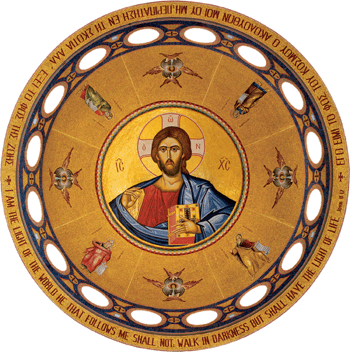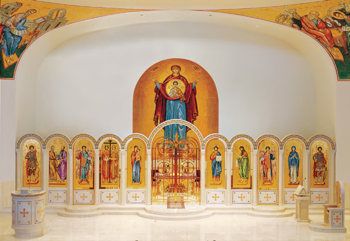 Issues, etc. Achieves New Low
Issues, etc. Achieves New Low
A friend sent me a link to a recent Issues, etc. podcast with the warning that I shouldn't listen to it while driving. Good advice. I often take "issue" with Pastor Wilkens, but it usually reflects different theological views. When he criticizes an Orthodox priest for failing to preach the crucifixion in a sermon, I understand that is based on his very narrow view of theology and his Lutheran perspective.
This time, however, he and his guest, Rev. Peter Bender, besides the usual doctrinal errors, actually go so far as to rewrite history, venture into amazing feats of illogic, and gloss over scriptural statements contrary to their position. I was utterly astounded.
History
Early on in the podcast, I heard Pastor Bender allude to the third ecumenical council as being the council where the filioque was added. I thought I had heard wrong. However, a few minutes later he speaks about the Third Ecumenical Council at Toledo. The problem with that is the Third Ecumenical Council happened at Ephesus. Far from changing the creed, there is a canon that some have actually read to mean that nobody is allowed to ever change the creed (such a reading is somewhat controversial, but is at the least a far cry from inserting new items). The word "Ecumenical" refers to universal (literally all the inhabited earth). That is, a council of all the churches. The council that Bender is referring to is the third council of Toledo, that is, the third of the local councils held at Toledo.
In fact, the addition of the filioque was entirely a Spanish thing. For centuries, there was no support for the addition among the Popes of Rome. In fact, even Pope Leo III, who famously crowned Charlemagne Holy Roman Emperor, was opposed to the addition:
Leo forbade the addition of "filioque" to the Nicene Creed which was added by Franks in Aachen in 809. He also ordered that the Nicene creed be engraved on silver tablets so that his conclusion might not be overturned in the future. He wrote «HAEC LEO POSUI AMORE ET CAUTELA ORTHODOXAE FIDEI» (I, Leo, put here for love and protection of orthodox faith)(VITA LEONIS, LIBER PONTIFICALIS (Ed.Duchene, TII, p.26)
Sola Scriptura?
Pastor Wilkens will be the first to shout "Sola Scriptura," but part of this episode was an exercise in anything but. He looks to a passage in John and says that this is the passage used to argue against the filioque:
But the Comforter, which is the Holy Ghost, whom the Father will send in my name, he shall teach you all things, and bring all things to your remembrance, whatsoever I have said unto you.
He's correct, in that this verse supports a non-filioque stance, and certainly does a wonderful eisegetical dance to disagree with it, but the key verse was the one that Pastor Bender quotes at the beginning of the podcast, but rushes the very end, as if embarrassed by what it says:
But when the Comforter is come, whom I will send unto you from the Father, even the Spirit of truth, which proceedeth from the Father, he shall testify of me.
Embarrassed he should be. For, of course we see that Scripture says that the Spirit proceeds from the Father. The Fathers of the council of Constantinople simply quoted scripture when they updated the Nicene Creed. If anyone is adhering to Sola Scriptura, then they are. Not the council of Toledo, not Luther, not Pastor Wilkens.
Logic Please
Clearly the funniest part is when Pastor Wilkens, always eager to poke Rome, asserts that the Eastern Orthodoxy has, as a result of not holding to the filioque, fallen into the error of extra-biblical revelation and the like, just like Rome. Leaving aside the issue of "extra-biblical" revelation, which is a blog entry all by itself, this statement is simply silly. Rome holds to the filioque. That was a primary reason for the break between Rome and the East. How is it that Rome fell into the same error even though they held to the filioque?
The other part of this, which should also be embarrassing to Pastor Wilkens, is he refers to someone who might have been Orthodox, or maybe just having an affinity for the Orthodox as saying that the denial of the filioque allows the Spirit freedom to do as he will within the Church. Frankly that sounds like something an Episcopalian might say. At any rate, we don't know who this person was, nor what qualifies them to speak on Orthodox theology. Then this statement is used to bang on the Orthodox Church. How pathetic.
Speaking of that Which they Do Not Know
Finally, I have to take issue with several comments made by both Wilkens and Bender. The first is that Christ is somehow not central in our liturgy. So let's start by briefly walking into our Church. First, we have the icon in the dome under which you stand as you approach for communion. Note Christ and the cross. I can't give you a good sense of scale, but this thing is huge. It is the inside of the big gold dome you can see from the freeway.

Of course, as we approach the altar we see this:

Of course there is Christ on the right. Then, although a little hard to see from this picture, is Christ on the Cross behind the altar. Then there is Christ and the Theotokos (by and large in Orthodox Iconography you don't see icons of the Theotokos without Christ, because she can't be who she is without him) - with Christ at the center, as he is and should be. Contrast this to a number of protestant churches I've been in where apparently the focal point of worship is either the choir or the pastor.
We can look at the liturgy itself. Broken up into sections, we have the litanies, where every prayer is ended with "let us pray to the Lord... Lord, have mercy" or "Grant this O Lord". We have the antiphons, which now largely consist of hymns such as, "Save us O Son of God," and "Through the prayers of the Theotokos, Savior save us". Then we have the procession of the Gospels, the procession of the bread and wine, representing the funeral of our Lord (can you say crucifixion?), and of course the entire canon of Communion. To make the statements that these gentleman did indicates that clearly they have never been in an Orthodox Church, they have never read or observed our Liturgy or any of the multitude of prayer services. In other words, they lend support to Abraham Lincolns view that "It is better to remain silent and be thought a fool than to open one's mouth and remove all doubt." At the same time, while Christ takes a center role in our Liturgy, it is not to the detriment of the other two persons of the Trinity.
Pastor Wilkens also asserts that the Orthodox Church makes the interior life of the Trinity as the center of its theology, and thus does not focus on the Atoning work of Christ. Unfortunately, as I noted in a previous entry, its not that we don't focus on the Atoning work of Christ, its that Pastor Wilkens doesn't understand what that work accomplishes. If he did, then he'd realize that the interior life of the Trinity, and communion with that, is precisely what is made possible by Christ's incarnation, death, and resurrection. We do not parse Scripture trying to understand the most important part, or the most important part of Christ's life. Instead, we take the whole thing, being a gift from God, and treat it as such.
The problem with the filioque is that is changes the dynamic of the Trinity. Instead of 3 persons in one substance, you end up with the Father and the Son really be ing God, and the Holy Spirit as some sort of servant or perhaps merely a relationship between the two. No longer do you have the Spirit processing from the Father, and the Son being begotten of the Father. These relationships make the distinctions between the persons of the Trinity. If the spirit has the same relationship with the Father and the Son, then that distinction is blurred or eliminated. Confusion follows. You can read a brief assessment of some problems with the filioque here. For a deeper read, I would recommend this book.
I think that there are further consequences of the breakdown of the Trinity. Pastor Wilkens exemplifies that with his insistence that Christ must be first and foremost in worship. While it is true that it is through him that we see God, how did we get to a place where the other two persons of the Trinity are less important? Well personally I think it began in a little place called Toledo.
Posted: Thursday - January 29, 2009 at 12:17 PM